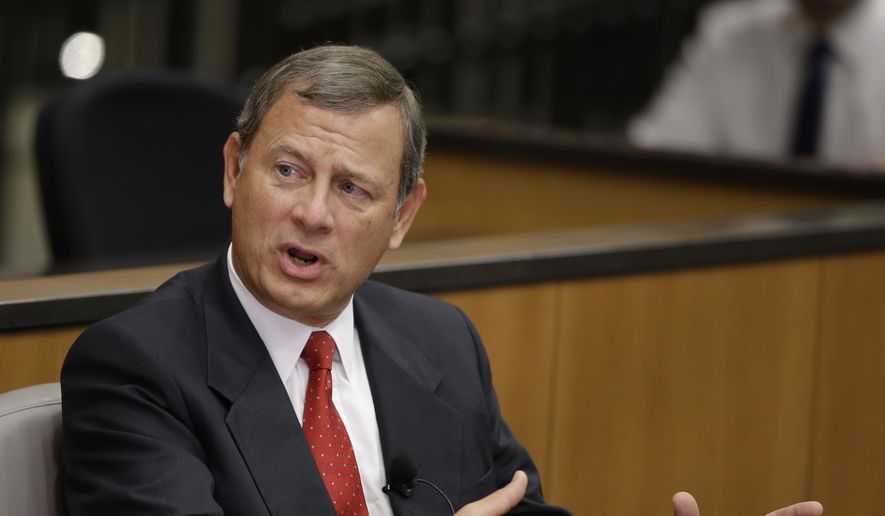Now an outcast among conservatives, Chief Justice John G. Roberts Jr. may get the chance to redeem himself in the coming months with his stand on affirmative action, the power of labor unions and other key cases, but some on the right say it’s too late for him to salvage his credibility with them.
The court over the next year will issue several highly consequential decisions in cases of deep importance to conservatives. The justices will decide whether labor unions can force nonmembers to pay the equivalent of union dues, whether universities should consider race during the admissions process and, in a case that could dramatically alter the political landscape, how voting districts can be drawn.
Other cases centering on abortion and gun rights also could find their way before the Supreme Court, giving Chief Justice Roberts chances to regain the faith of conservatives who believe he betrayed them with two votes in three years to salvage the Affordable Care Act and cement a central piece of President Obama’s legacy.
High-profile conservatives ripped the court — and Chief Justice Roberts in particular — after its 6-3 decision upholding the federal subsidy system in Obamacare. Chief Justice Roberts also was the swing vote in the 2012 ruling that affirmed the law’s individual mandate.
In the most recent Obamacare decision, Justice Antonin Scalia, a conservative fixture on the court, blasted his fellow justices, saying Mr. Obama’s health care law should be renamed “SCOTUScare” after being protected by the Roberts court.
Sen. Ted Cruz of Texas, a Republican presidential candidate, said the court’s end-of-term decisions on Obamacare and same-sex marriage amounted to a “dark day for America.”
The heavy criticism underscores how many conservatives feel deeply betrayed by Chief Justice Roberts. Appointed by President George W. Bush in 2005, he was expected to be a staunch conservative who would pull the court to the right.
Despite the potential for the court to side firmly with the conservative movement on a host of issues, some critics on the right say Chief Justice Roberts has caused irreparable harm to his reputation.
“I think it’s too late for him to get back the reputation he had, say, pre-2012. Part of the reason isn’t because you can’t recover from two bad decisions, but because the stakes were so high” on the Obamacare rulings, said Curt Levey, president of the Committee for Justice, a group that advocates for more conservative judges.
Upcoming cases, Mr. Levey said, simply don’t carry the same weight for all Americans as the decision to uphold the Affordable Care Act.
“On some of these issues, the stakes aren’t as high. Most people aren’t affected by whether the University of Texas has affirmative action but Obamacare affects and captivates everyone, so I don’t think he’ll ever escape the black mark,” he said. “More importantly, the way he ruled in that case shows he’s not a true conservative.”
In the affirmative action case, the court will decide the extent to which universities can consider the race of applicants. If the court says they cannot, the number of minority students at colleges across the country likely will drop, but critics of affirmative action say each applicant should be judged merits alone.
The court also is expected next year to settle the long-standing “one man, one vote” question, which centers on whether voting districts should be drawn based on the voting-eligible population or the total population.
Drawing districts based on the total population according to U.S. census data would move political power to urban areas, which skew Democratic but also include higher numbers of illegal immigrants, prisoners, children and others who are not eligible to vote.
If the justices say districts must be equal in numbers of registered voters, political power could be transferred away from urban centers and toward more rural, Republican-leaning areas.
The justices also will rule on a case that will determine reach of public-sector labor unions. A group of nonunion California teachers brought the challenge, charging that their free speech rights were violated when they were forced to pay the equivalent of union dues, which often go toward political activity that favors Democrats.
The court also is likely to revisit a Texas statute that established health care regulations on abortion clinics and likely would have forced many of those clinics to close. The court temporarily halted the law last month but hasn’t issued a final ruling on whether the law is constitutional.
Some legal analysts say the wave of conservative criticism directed at Chief Justice Roberts is off base.
Chief Justice Roberts, contrary what some on the right may have hoped, will not go out on a limb to favor conservative causes, and a handful of opinions shouldn’t define his term on the bench, said Ilya Shapiro, a senior fellow in constitutional studies at the libertarian Cato Institute.
“You can talk about redemption or whatnot, but it’s not like the justices go into a term thinking, ’This term, I’m going to try to be more liberal or conservative or whatever.’ They are who they are. I don’t think John Roberts is evolving in any direction. He’s just a different type of conservative. He’s all about judicial restraint,” Mr. Shapiro said.
“I wouldn’t be surprised at all if in the next term we get so-called conservative results on affirmative action, on union dues, on ’one man, one vote,’ the case out of Texas on abortion — but that wouldn’t mean John Roberts is consciously changing himself so he can redeem himself in conservatives’ eyes,” he said.
• Ben Wolfgang can be reached at bwolfgang@washingtontimes.com.




Please read our comment policy before commenting.